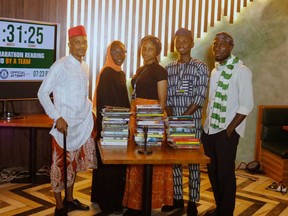Lifestyle
Nigerian Group Completes 431-Hour Reading Marathon for Record

In a remarkable feat of endurance and dedication, a group of five individuals in Lagos, Nigeria, participated in a reading marathon lasting over 431 hours as part of an effort to set a new Guinness World Record for the longest continuous reading aloud. This initiative, organized by the nonprofit Naija ReadFest, aims to promote literacy and celebrate Nigerian literature in the country, which has a population exceeding 210 million people.
The marathon, which took place in a local restaurant, commenced on a date in early October and concluded on a Saturday when the final tally revealed that the group had read a total of 79 books, all authored by Nigerians. Participants included Precious Ukachi, John Obot, Stephen Oyelami, Temitope Ogunremi, and Ketura Heman, who took turns reading various literary works and self-help books, allowing each other brief moments to rest.
Throughout the challenge, supporters gathered both in-person and online, cheering the participants as they pushed through the demanding hours. Ukachi, a 30-year-old marathoner, expressed the motivation behind her participation, stating, “Most people don’t have access to books, and I participated to encourage inclusive education.”
Obot, who is 37, shared the difficulties faced during the night shifts of the marathon. “We had limited time to rest, but what kept me going was the goal,” he said. The current record for the longest reading aloud marathon is held by a group from the Dominican Republic, which managed 365 hours and 39 seconds in 2011.
The marathon concluded with a final reading time of 431 hours, 31 minutes, and 25 seconds. While the Guinness World Record has yet to officially confirm the new record, the nonprofit organization behind the event plans to submit all required evidence for verification. Kingsley Sintim of Naija ReadFest remarked, “We did this to celebrate Nigerian literature,” highlighting the purpose of the event to raise awareness of local authors’ works and their relevance to both young and older audiences.
Nigeria faces significant challenges in literacy, with over 10 million children currently out of school and a national literacy rate estimated at just 63% in 2021. Advocates argue that this figure has seen little improvement in recent years. Oyelami, also a participant, noted the challenges in accessing books, stating, “It was difficult to get books because of the kind of environment I grew up in.”
The issues stem partly from insufficient investment in the education sector, according to Irene Okon, the executive director of Lead-Out, a nonprofit dedicated to enhancing education in public and low-income schools. Author Carol Yaakugh, based in Abuja, added that while many tech startups are addressing various sectors, the literacy space remains largely neglected.
The situation is illustrated by the long-delayed National Library project in Abuja, which was launched in 2006 but remains unfinished, raising questions about public funding priorities. The efforts of the Naija ReadFest and the dedication of the reading marathon participants underscore the urgent need for greater focus on literacy and education in Nigeria, a country with immense potential and a rich literary heritage.
-

 Science2 months ago
Science2 months agoToyoake City Proposes Daily Two-Hour Smartphone Use Limit
-

 Health2 months ago
Health2 months agoB.C. Review Reveals Urgent Need for Rare-Disease Drug Reforms
-

 Top Stories2 months ago
Top Stories2 months agoPedestrian Fatally Injured in Esquimalt Collision on August 14
-

 Technology2 months ago
Technology2 months agoDark Adventure Game “Bye Sweet Carole” Set for October Release
-

 World2 months ago
World2 months agoJimmy Lai’s Defense Challenges Charges Under National Security Law
-

 Technology2 months ago
Technology2 months agoKonami Revives Iconic Metal Gear Solid Delta Ahead of Release
-

 Technology2 months ago
Technology2 months agoSnapmaker U1 Color 3D Printer Redefines Speed and Sustainability
-

 Technology2 months ago
Technology2 months agoAION Folding Knife: Redefining EDC Design with Premium Materials
-

 Technology2 months ago
Technology2 months agoSolve Today’s Wordle Challenge: Hints and Answer for August 19
-

 Business2 months ago
Business2 months agoGordon Murray Automotive Unveils S1 LM and Le Mans GTR at Monterey
-

 Lifestyle2 months ago
Lifestyle2 months agoVictoria’s Pop-Up Shop Shines Light on B.C.’s Wolf Cull
-

 Technology2 months ago
Technology2 months agoApple Expands Self-Service Repair Program to Canada









